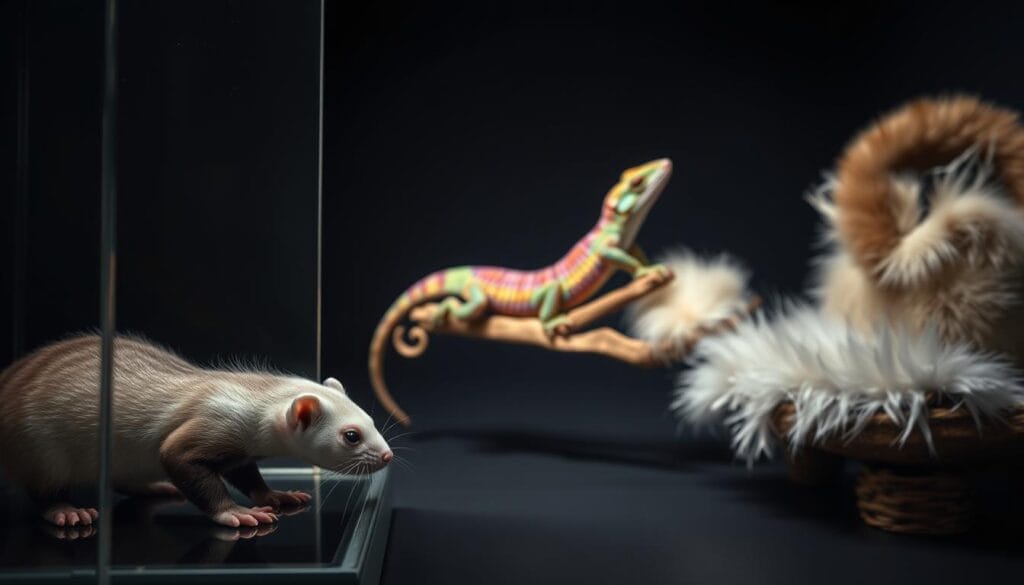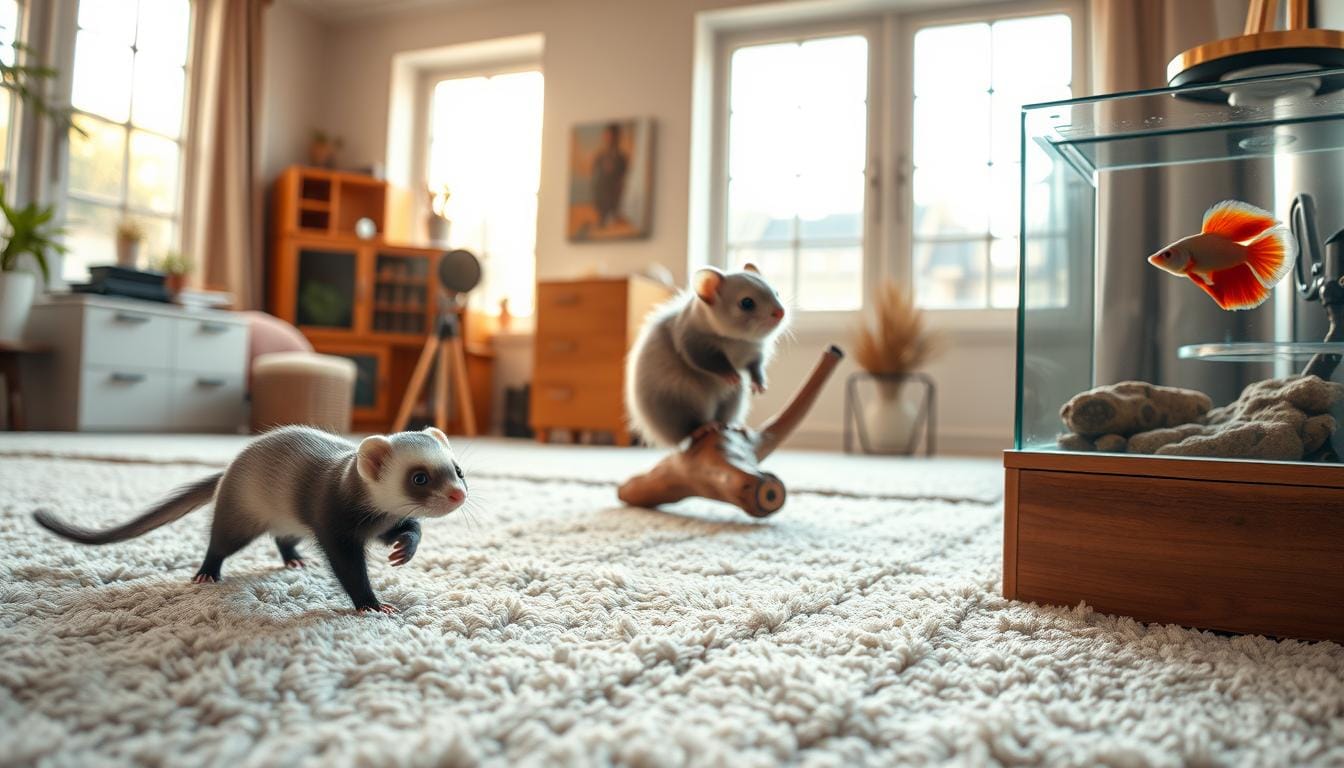Do you feel left out because your allergies stop you from having pets? You’re not alone. Many people with allergies want a pet’s love and company. Luckily, hypoallergenic exotic pets are a great option. They let you enjoy pet love without allergies.
Thinking of getting a pet that’s good for allergies? It’s key to know what pets are out there and how to care for them. For beginners, beginner-friendly exotic pets are a good place to start. This guide will help you pick the right pet and give you care tips for a happy, healthy home.
Table of Contents
Understanding Hypoallergenic Pets
For people with allergies, “hypoallergenic pets” offer hope. But what does it mean? These pets make fewer allergens than others. They are not completely free of allergens.
What Does Hypoallergenic Mean?
“Hypoallergenic” means pets that are less likely to cause allergic reactions. They are not 100% safe for everyone with allergies. But they make fewer allergens.
Common traits of hypoallergenic pets include:
- Low-shedding coats
- Less dander production
- Single-layer coats instead of double
These traits mean they release fewer allergens. This makes them good for exotic pets for allergy sufferers.
Common Misconceptions About Hypoallergenic
Many think hypoallergenic pets are completely safe for allergies. But they might still cause reactions in some. Another myth is they need less grooming. But regular grooming is key to reduce allergens.
It’s important to understand these points. Also, talk to health experts if you have severe allergies.
Benefits of Hypoallergenic Exotic Pets
Hypoallergenic exotic pets offer more than just less allergy trouble. They also bring unique companionship opportunities. By picking a pet that fits your needs, you can have a rewarding relationship without worrying about severe allergies.
Reduced Allergy Symptoms
Hypoallergenic exotic pets are great for those with allergies. They produce fewer allergens than regular pets. This makes them perfect for people who can’t have pets because of allergies.
Experts say choosing a hypoallergenic pet is smart for homes with allergy sufferers. It’s great for families or people who couldn’t have pets before because of allergies.
Unique Companionship Opportunities
Hypoallergenic exotic pets offer unique companionship opportunities. They have special personalities and traits. This makes for a more interesting and fulfilling relationship with your pet.
- They can be trained to do tricks and follow commands.
- Many hypoallergenic exotic pets are very affectionate.
- They offer companionship without the usual allergy worries of regular pets.
Getting a hypoallergenic exotic pet means gaining a friend. It also brings joy and connection into your life. As more people learn about best hypoallergenic pets, the chance to form a special bond with them grows.
Popular Hypoallergenic Exotic Pets
There are many hypoallergenic exotic pets to choose from. It’s important to pick the right one for your lifestyle. These pets offer a special companionship without the usual allergy worries.
Selecting the Right Species for You
When selecting a hypoallergenic exotic pet, think about your living space and how much time you can spend with your pet. Also, consider your experience with exotic animals. Some pets need more care and space than others.
For example, hedgehogs and sugar gliders are good choices because they are hypoallergenic. But, they need special care.
- Learn about the pet’s needs.
- Check if your space is big enough for the pet.
- Think if you can give the pet the care it needs.
Comparing Different Types of Pets
Each hypoallergenic exotic pet is unique. For instance, reptiles don’t have dander, but they need special light and heat.
| Pet Type | Hypoallergenic Characteristics | Care Requirements |
|---|---|---|
| Hedgehogs | Low dander production | Temperature control, dietary needs |
| Sugar Gliders | Minimal shedding | Social interaction, specific diet |
| Reptiles | No dander production | Specific lighting, temperature control |
By looking at these points, you can choose the best hypoallergenic exotic pet for you.
Assessing Your Lifestyle
Looking at your daily routine and living situation is key to picking the right hypoallergenic exotic pet. Your lifestyle affects how well a pet fits into your home.
Time Commitment and Care Requirements
Exotic pets have different care needs. Some need a lot of time for grooming and training. Others are more independent.
Care Requirements for Different Pets:
- Some exotic pets, like certain birds, need daily interaction and a varied diet.
- Reptiles need a special temperature environment and a set feeding schedule.
- Small mammals, like hedgehogs, need regular cage cleaning and social time.
Make sure you can give your pet the care and attention it needs.
Space Considerations for Different Pets
Think about the space in your home when choosing an exotic pet. Some pets need a lot of room, while others are happy in smaller spaces.
| Pet Type | Space Requirements | Special Considerations |
|---|---|---|
| Birds | Large aviaries or spacious cages | Need room to fly and exercise |
| Reptiles | Appropriately sized terrariums | Temperature control and UVB lighting |
| Small Mammals | Cages or enclosures with hiding places | Regular cleaning and social interaction |
Think about your lifestyle, including your time and space, to choose the right hypoallergenic exotic pet.
Allergies and Sensitivities
To have a good relationship with your hypoallergenic exotic pet, you need to know about your allergies. Allergies happen when your body reacts to something it doesn’t like, like pet dander or saliva. Knowing what you’re allergic to is key in choosing allergy-friendly exotic pets.
Understanding Your Allergies
Finding out what you’re allergic to takes some work. You might need to get tested to see what makes you react. Signs of an allergy include sneezing, itching, and rashes. If you’re thinking about getting a hypoallergenic pet, check if you could react to it.
For more info on small exotic animals as pets, check out https://exoticpethaven.com/small-exotic-animals-as-pets/. This site has lots of useful info on different exotic pets.
Consultations with Allergists
Talking to an allergist is a big step in how to choose hypoallergenic exotic pets. They can give you advice based on your allergies and health. They might suggest tests or steps to take when you get a new pet.
When you talk to the allergist, tell them about your plans for a hypoallergenic pet. They can help you avoid allergic reactions and make sure your home is safe for you and your pet.
By following these steps, you can have a great time with your hypoallergenic exotic pet. You’ll reduce the chance of allergic reactions and make a happy home for both of you.
Researching Exotic Pet Breeders
To get a healthy hypoallergenic exotic pet, you must research breeders well. It’s important to know what makes a pet hypoallergenic. Also, find breeders who care about animal health and happiness.
Finding Reputable Breeders
Good breeders are key to your pet’s health and happiness. Look for breeders listed with exotic pet associations or clubs. These groups often have breeder lists.
Ask friends, family, or vets for breeder recommendations. Online reviews can help, but watch out for fake ones.

Questions to Ask a Breeder
When you find breeders, ask them important questions. Here are some:
- What health guarantees do you offer for your pets?
- Can you provide veterinary records and health clearances for the parents of the pet I’m interested in?
- How do you socialize your pets, and what kind of environment are they raised in?
- What kind of support or resources do you offer to new owners?
These questions help you understand the breeder’s practices. This ensures you get a healthy pet.
| Breeder Characteristics | Reliable Breeder | Irresponsible Breeder |
|---|---|---|
| Health Guarantees | Provides comprehensive health guarantees | Lacks clear health guarantees |
| Veterinary Care | Regular veterinary check-ups for pets | No regular veterinary care mentioned |
| Socialization | Pets are well-socialized and handled regularly | Little to no socialization mentioned |
By researching and evaluating breeders, you can find a healthy hypoallergenic pet. This pet will fit your lifestyle and be a great companion.
Preparing Your Home for a New Pet
Before your hypoallergenic exotic pet arrives, make sure your home is ready. This means setting up a space that cuts down on allergens. You’ll also need to get the right stuff to take care of your new friend.
Creating an Allergen-Free Environment
To cut down on allergies, make your home allergen-free. Start by cleaning your home well, focusing on where your pet will hang out. Use a HEPA-filter vacuum to get rid of dander and allergens from floors and furniture. Think about swapping carpets for hardwood or tile to stop allergens from building up.
Regular cleaning is key to keeping your home allergen-free. Make a cleaning schedule that includes daily quick tidies and weekly deep cleans. This keeps your home comfy for you and your pet.
“A clean home is not just about looks; it’s about making a healthy space for you and your pet to do well.”
Essential Supplies You Will Need
Getting the right stuff is crucial for your exotic pet’s health. Here are the basics you’ll need:
- A good enclosure or habitat for your pet
- The right food and water dishes
- A diet that meets your pet’s nutritional needs
- Toys and activities to keep your pet busy
- Grooming tools that fit your pet’s coat type
| Supply | Description | Importance Level |
|---|---|---|
| HEPA-filter vacuum | Removes allergens and dander | High |
| Pet enclosure | Provides a safe place | High |
| Grooming tools | Keeps your pet’s coat healthy | Medium |
| Toys and enrichment | Keeps your pet engaged | Medium |
By getting your home ready and gathering the right supplies, you’re on the path to a happy and healthy home for your exotic pet. Remember, the secret to a great living situation is being prepared and paying attention to the details.
Transitioning into Pet Ownership
Getting a new exotic pet that’s hypoallergenic needs careful planning and patience. You’re not just getting a pet, but a new friend who will bring joy and love into your life.
Gradual Introduction to Your Home
When introducing your new pet to its new home, do it slowly. First, set up a special area for your pet with everything it needs. This makes it easier for your pet to adjust to its new home.
- Prepare a safe and comfortable area for your pet.
- Gradually introduce your pet to different parts of the house.
- Supervise interactions between your pet and other household members.
Training and Socialization Tips
Training and socialization are key for a good relationship with your non-allergenic exotic pet. Start with simple commands and then move to more complex ones. Socialization makes your pet confident and calm around new people, places, and animals.
| Training Tips | Socialization Strategies |
|---|---|
| Start with simple commands like “sit” or “stay.” | Introduce your pet to new environments gradually. |
| Use positive reinforcement techniques. | Arrange meetings with other pets and people. |
| Be consistent and patient. | Reward calm behavior in new situations. |
By following these steps and dedicating time to your pet’s training and socialization, you can create a strong bond. Remember, patience and understanding are essential for a smooth transition into pet ownership.
Long-Term Care and Maintenance
To keep your hypoallergenic exotic pet happy and healthy, you need to know about long-term care. This includes regular health checks, grooming, and keeping their living space clean. These steps help your pet stay well.
Regular Health Check-ups
It’s important to catch health problems early with your pet. Schedule annual or bi-annual visits with a vet who knows about exotic pets. These visits can stop small issues from getting worse.
- Watch your pet’s health and behavior closely.
- Talk to your vet about any changes or worries.
- Make sure your pet gets all the shots and preventatives they need.
Grooming and Cleaning Practices
Grooming is key for your hypoallergenic exotic pet. Regular grooming sessions cut down on allergens and make your bond stronger.
Here are some grooming and cleaning tips:
- Brush your pet often to cut down on shedding and hairballs.
- Clean their home often, changing bedding and removing waste.
- Use products that reduce allergens when cleaning.

By sticking to these care and maintenance tips, you can make a great home for your hypoallergenic exotic pet. Remember, caring for a pet is a long-term commitment. Always be ready to give your pet the care and attention they need.
Nutrition for Hypoallergenic Pets
Hypoallergenic exotic pets need a diet that meets their nutritional needs. It’s important to ensure they get the right nutrients for their health.
Choosing the Right Food
Choosing the right food for your hypoallergenic exotic pet is key. Each species has its own dietary needs. It’s crucial to research what your pet needs.
Some pets need a lot of protein, while others need special vitamins and minerals. Talking to a vet or pet nutritionist can guide you.
Supplements and Diet Adjustments
Supplements are important for your pet’s health. But, always check with a vet before adding them to avoid problems.
Adjusting your pet’s diet is also important. This depends on their age, health, and lifestyle. Keeping an eye on their health and diet helps them stay healthy and happy.
By giving your pet a balanced and nutritious diet, you help them stay healthy and happy.
Legal Considerations and Regulations
It’s key to know the laws about hypoallergenic exotic pets for a good pet experience. When thinking about getting a new pet, you must understand the legal rules. This ensures you follow local laws and regulations.
First, look into local pet laws. These can differ a lot from place to place. Laws might say what pets are okay, what permits you need, and what owning a pet means.
Researching Local Pet Laws
Start by talking to local animal control or a government agency. They can tell you about the laws in your area. Knowing this helps avoid legal problems with exotic pets. Some places might not let you have certain pets.
Key areas to investigate include:
- Permits and licenses needed for exotic pets
- Rules on the types of exotic pets allowed
- Health and safety rules for pets and the community
Required Permits for Exotic Pets
Getting the right permits is a big step in owning an exotic pet legally. You’ll need to apply, pay a fee, and possibly have your home checked. This makes sure it’s safe for your pet.
Remember, permit rules can change. So, it’s smart to keep up with local laws. Check with local authorities or a pet organization often. This way, you’ll know about any new rules.
By following local laws and regulations, you can enjoy your hypoallergenic exotic pet. And you’ll be a responsible and law-abiding pet owner.
Building a Support Network
Welcoming a hypoallergenic exotic pet into your life is exciting. But, it’s also important to build a support network. Connecting with others who love low allergy exotic animals can be very helpful. It gives you a sense of community and helps you deal with the ups and downs of pet care.
Connecting with Fellow Enthusiasts
Joining online forums and social media groups for exotic pet owners is a smart move. These groups are filled with people who get what it’s like to care for these pets. They share tips, resources, and stories that can make a big difference in your pet’s care.
Accessing Valuable Resources
There are many online resources for exotic pet care. Blogs and websites are full of useful information. By using these resources and connecting with other owners, you can build a strong support network. This network will make your experience as a hypoallergenic exotic pet owner even better.

